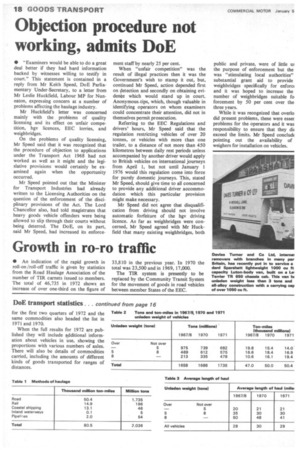Objection procedure not working, admits DoE
Page 20

If you've noticed an error in this article please click here to report it so we can fix it.
• "Examiners would be able to do a great deal better if they had hard information backed by witnesses willing to testify in court." This statement is contained in a reply from Mr Keith Speed, DoE Parliamentary Under-Secretary, to a letter from Mr Leslie Huckfield, Labour MP for Nuneaton, expressing concern at a number of problems affecting the haulage industry.
Mr Huckfield's letter was concerned mainly with the problems of quality licensing and its effect on unfair competition, hgv licences, EEC lorries, and weighbridges.
On the problems of quality licensing, Mr Speed said that it was recognized that the procedure of objection to applications under the Transport Act 1968 had not worked as well as it might and the legislative provisions would certainly be examined again when the opportunity occurred.
Mr Speed pointed out that the Minister for Transport Industries had already written to the Licensing Authorities on the question of the enforcement of the disciplinary provisions of the Act. The Lord Chancellor also, had told magistrates that heavy goods vehicle offenders were being allowed to slip through their courts without being deterred. The DoE, on its part, said Mr Speed, had increased its enforce ment staff by nearly 25 per cent.
When "unfair competition" was the result of illegal practices then it was the Government's wish to stamp it out, but, continued Mr Speed, action depended first on detection and secondly on obtaining evidene which would stand up in court. Anonymous_tips, which, though valuable in identifying operators on whom examiners could concentrate their attention, did not in themselves permit prosecution.
Referring to the EEC Regulations and drivers' hours, Mr Speed said that the regulation restricting vehicles of over 20 tonnes, or vehicles with more than one trailer, to a distance of not more than 450 kilometres between daily rest periods unless accompanied by another driver would apply to British vehicles on international journeys from April 1, but not until January 1 1976 would this regulation come into force for purely domestic journeys. This, stated Mr Speed, should give time to all concerned to provide any additional driver accommodation which this particular provision might make necessary.
Mr Speed did not agree that disqualification from driving should not involve automatic forfeiture of the hgv driving licence. As far as weighbridges were concerned, Mr Speed agreed with Mr Huckfield that many existing weighbridges, both public and private, were of little us the purpose of enforcement but the was "stimulating local authorities" substantial grant aid to provide weighbridges specifically for enforc( and it was hoped to increase the number of weighbridges suitable fo forcement by 50 per cent over the three years.
While it was recognized that overlo did present problems, these were esser problems for the operators and it was responsibility to ensure that they di( exceed the limits. Mr Speed conduct( pointing out the availability of weighers for installation on vehicles.




























































































